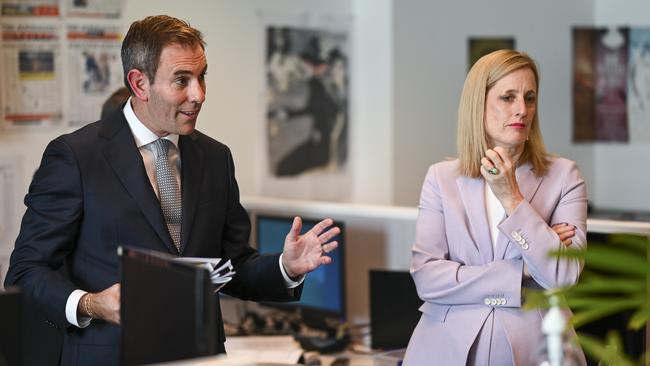
Especially for Labor, for whom they have been rare.
Collecting more in tax than you spend means you’re not adding to the stock of debt, thus relieving future taxpayers of some of the repayment burden.
Jim Chalmers has been the beneficiary of a fortunate set of circumstances, on both sides of the ledger.
Vladimir Putin’s dirty Ukraine war has pumped up inflation and commodity prices, while over-stimulus by the Reserve Bank and the Morrison government during the pandemic has ignited demand and employment in the recovery.
This has supercharged the tax take from workers and businesses.
On the spending side, the built-in obsolescence of crisis-era free money and extra health costs has helped the Treasurer and Finance Minister Katy Gallagher to keep growth in outlays at a respectable level – although not as fabulous as they claim.
Yet because this is at heart a traditional, old Labor show, and as it encounters voter demands for pain relief during a cost-of-living upheaval, the duo’s relative spending restraint deserves a credit mark.
Perhaps more so, given the ambitious Chalmers will want to earn the esteem and support of spending ministers he’s had to rebuff in two budget rounds, who may not join the jots on how more money into a capacity-constrained economy would inflame inflation.
Then there’s the PR task of saying no to the public, as the published polls reveal cracks in the Albanese government’s primary vote, which was low to begin with.
This at a time when growth will be at a crawl leading up to 2025, when the next federal election is due.
As the OECD flagged this week, Australia’s projected annual GDP increase will average just over 1.5 per cent this year and next, which would be the weakest 24 months of non-pandemic growth in more than 30 years.
The Paris-based think tank’s head, Mathias Cormann, urged his rich-country members to reduce inflation and rebuild fiscal buffers, as well as lay the groundwork for stronger and more sustainable growth.
But back to the true state of the budget, which has fallen out of the spotlight because the urgent takes precedence over the important in Canberra, as it often does in life.
The underlying fiscal trends aren’t great.
In his exit remarks a fortnight ago, former Reserve Bank governor Philip Lowe called for a strong commitment to a credible fiscal framework that deals with the next 10 years and considers the burden on younger Australians.
“Governments face many demands on their budgets and when they borrow today, they need to be able to service that debt into the future,” Lowe said.
“Some countries have not dealt with this intertemporal aspect of fiscal policy very well and public debt levels have kept rising, storing up problems for the future.
“Australia has done better on this front, but we are not immune to the pressures on the public purse and these pressures are growing.”
They are indeed.
Last month’s Intergenerational Report put us in a time machine to 2063, mentally bypassing the traumas and turbulence of the 2020s, which Chalmers calls the “defining decade”.
We have growing costs for disability services, defence, aged care, health and debt servicing, and a tax base that, to be kind, is sub-optimal in so many ways.
Both spending and taxing need attention in Canberra to fix the structural deficiencies we’ve imposed and accumulated.
Only those in ideological bubbles argue that it can be done by just jacking up taxes, or by bearing down pitilessly on costs.
More worrying in the next few years is the vagueness of the fiscal strategy, the absence of any hard rules.
Chalmers argues that it will take more than one budget or term to get the budget in shape, after the mess left by the previous tenants.
Fine-tuning may sound OK in the afterglow of a one-off surplus, but the golden moment is quickly fading.







Pardon the Monty Python echo, but every surplus is sacred.